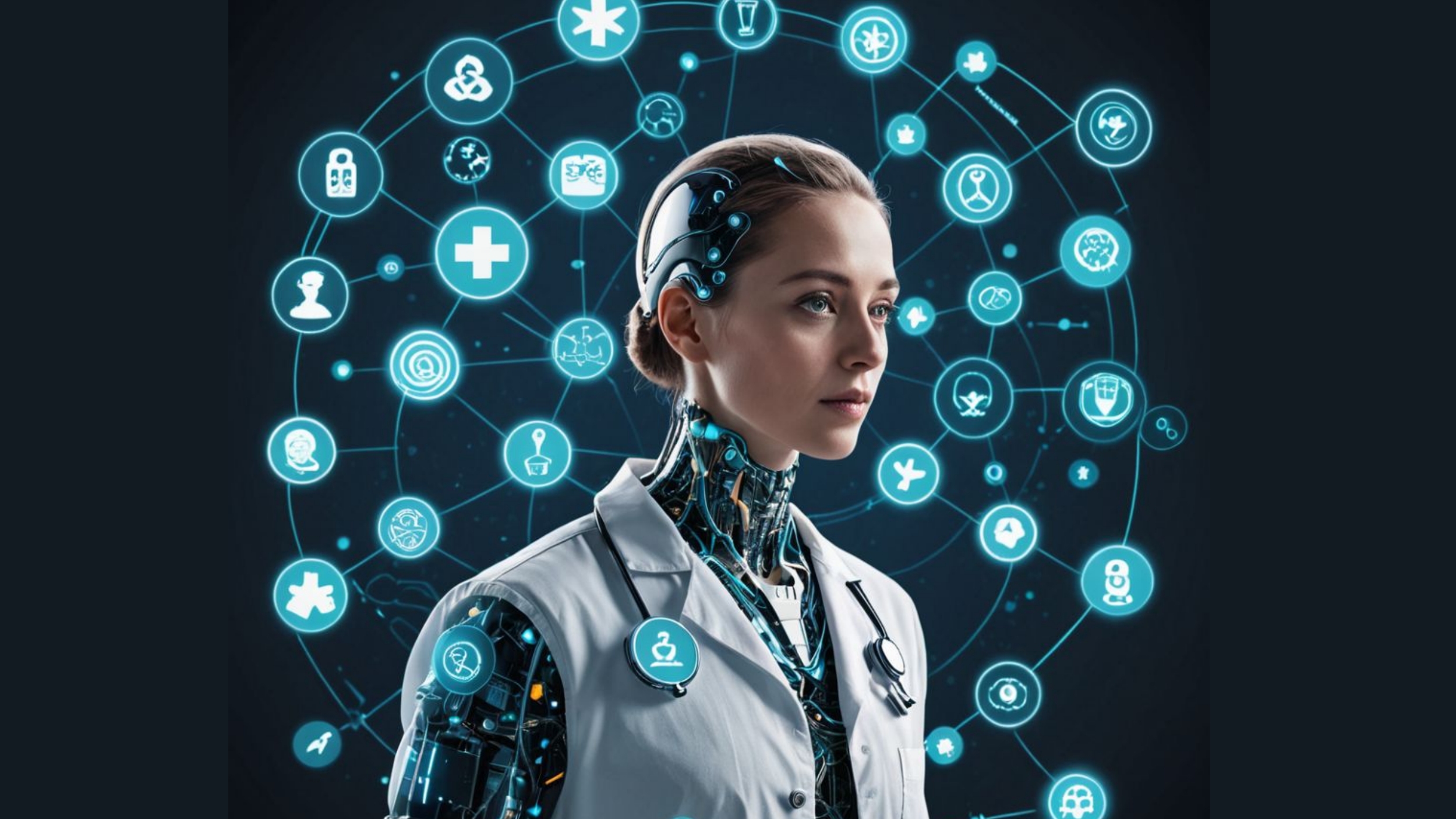Will AI Replace Doctors? Reforming the Future of Healthcare
Table of Contents
Artificial intelligence (AI) is revolutionizing the healthcare industry, with applications ranging from diagnostics to treatment planning. Although AI is advancing rapidly, it’s unlikely to replace doctors completely. The question arises: Could AI eventually take over the role of doctors? This debate is gaining momentum in both medical and tech communities. In this article, we will explore AI’s healthcare promises and its challenges in replacing doctors. Understanding this issue is crucial not only for healthcare professionals but also for job seekers and anyone interested in the future of medicine in an AI-driven world.

Can AI Replace Doctors? Very Unlikely
The potential for AI to replace doctors is a topic of ongoing debate. On the one hand, AI can automate many routine and time-consuming tasks, enabling doctors to focus on more complex cases and patient care. For example, AI can assist radiologists in detecting tumors or fractures more accurately in medical images. It can also automate the documentation of patient information and the processing of lab results, significantly reducing administrative burdens. This frees up time for doctors to engage more directly with patients, improving both efficiency and the overall healthcare experience.
AI’s Potential Benefits:
- Automating Routine Tasks: AI can take over time-consuming, repetitive tasks, allowing doctors to focus on patient care.
- Assisting in Diagnostics: AI helps radiologists detect tumors or fractures in medical images with higher accuracy.
- Reducing Administrative Burden: AI automates the documentation and processing of lab results, freeing up doctors’ time.
However, despite these significant benefits, AI has clear limitations. AI lacks the human qualities critical in healthcare, such as empathy, ethical decision-making, and nuanced judgment. Doctors don’t just rely on medical knowledge—they consider a patient’s emotional and social context when making decisions. For example, in chronic illness or end-of-life care, doctors make decisions respecting patient values—something AI cannot replicate. Furthermore, AI struggles with unpredictable or complex situations requiring intuition, experience, and human judgment, areas where doctors still excel.
AI’s Limitations:
- Lack of Human Qualities: AI cannot replicate essential traits such as empathy, ethical judgment, or nuanced decision-making.
- Complex Decision-Making: AI struggles in situations involving emotional and social considerations, such as in chronic illness or end-of-life care.
- Intuition and Experience: AI cannot replace the intuition and experience of doctors when faced with unpredictable or complex situations.
While AI will continue to transform healthcare, it is unlikely to replace doctors entirely. Instead, it will complement their capabilities, making healthcare systems more efficient while allowing doctors to focus on what only they can do best: offering compassionate, patient-centered care.
What Role Does AI Play in Healthcare Today?
AI is already making a significant impact in healthcare, assisting doctors in various ways to enhance patient care. One of its primary applications is diagnostic assistance, where AI algorithms analyze medical images such as X-rays, CT scans, and MRIs, identifying patterns that may be difficult for the human eye to detect. For example, AI effectively helps radiologists identify cancer, fractures, and other conditions with greater precision. In dermatology, AI tools analyze skin images to detect early signs of melanoma, providing doctors with an additional diagnostic tool.
Additionally, scientists use AI to predict drug interactions and speed up treatment development. Beyond diagnostics, AI is also improving patient monitoring systems and assisting in robotic surgeries, demonstrating its versatility in enhancing care delivery. AI processes vast data to make accurate diagnoses. It improves treatment outcomes and enhances healthcare efficiency.
As AI continues to revolutionize healthcare, the growth potential across different areas is remarkable. The following chart illustrates the expected market growth for AI applications in healthcare between 2020 and 2025, with particular emphasis on diagnostic tools, personalized treatment, and patient management systems. The data highlights how rapidly AI is being integrated into various healthcare sectors, and how it is set to become an indispensable tool for improving patient outcomes and healthcare efficiency.
Estimated Projected Market Growth of AI in Healthcare (2020-2025)
| AI Application | 2020 Market Size (USD Billion) | Estimated 2025 Projected Market Size (USD Billion) | CAGR (Compound Annual Growth Rate) |
|---|---|---|---|
| Diagnostic Tools (e.g., imaging, analysis) | 2.2 | 6.8 | 25.5% |
| Personalized Treatment (e.g., precision medicine) | 1.5 | 4.4 | 24.5% |
| Patient Monitoring (e.g., wearables, sensors) | 3.1 | 9.5 | 22.4% |
| AI-driven Drug Discovery | 0.9 | 3.2 | 30.1% |
| Robotic Surgery (AI-assisted) | 1.8 | 4.9 | 22.0% |
Source: MarketsandMarkets, Grand View Research, and Accenture Insights
How AI Enhances Doctors’ Work Instead of Replacing Them
Rather than replacing doctors, AI acts as a powerful tool that complements their expertise and enhances their decision-making abilities. One of the key ways AI assists doctors is through decision support. By analyzing medical data, AI provides doctors with insights and treatment options for more informed decisions. This is especially valuable in diagnosing rare diseases or predicting potential complications that may not be immediately apparent, improving diagnostic accuracy.
In addition, AI offers substantial efficiency gains by automating routine administrative tasks such as scheduling, billing, and documentation. This reduces repetitive tasks, allowing doctors to focus on patient care and improve healthcare delivery. AI’s ability to handle administrative duties frees doctors to concentrate on areas that require human judgment, such as patient interaction, empathetic care, and complex decision-making.
As Dr. John Halamka, a healthcare expert at Harvard Health, puts it: “AI is not here to replace doctors, but to empower them by providing tools that enhance their ability to deliver better, more personalized care.” This collaborative approach positions AI as a partner that augments doctors’ abilities rather than competes with them. Together, AI and human doctors can create a healthcare system that is more efficient, accurate, and compassionate.
Ethical Considerations in the Use of AI in Healthcare
As AI grows in healthcare, ethical concerns must be addressed for safe and fair use. One of the most pressing issues is bias in AI algorithms. AI systems are trained on data, and if that data is biased—such as underrepresenting certain demographic groups—AI may inadvertently reinforce these biases. This could lead to unequal healthcare outcomes, with certain populations receiving suboptimal care. For example, AI algorithms diagnose skin cancer less accurately for darker skin tones, as researchers trained them on predominantly lighter-skinned patients.
Another significant concern is privacy and security. AI systems require vast amounts of patient data to function effectively, and with this comes the risk of data breaches or misuse. Protecting sensitive health information is crucial, especially when AI systems are integrated across multiple platforms, raising questions about who controls and safeguards this data.
Finally, there is the issue of accountability. If an AI system makes an error—such as a misdiagnosis or treatment recommendation—who will be responsible? Is it the developer, the healthcare provider, or the AI itself? Determining liability in such cases is complex, as the use of AI in healthcare blurs the lines of traditional medical responsibility (PMC Article).
To fully realize AI’s potential in healthcare, these ethical issues must be carefully considered and addressed. Organizations will need to establish clear guidelines, regulations, and transparent systems to ensure healthcare settings use AI responsibly and equitably.
Will AI Lead to Job Losses in Healthcare?
The rise of AI in healthcare is unlikely to result in widespread job losses but will lead to the evolution of roles and the creation of new opportunities. While AI can automate many routine tasks such as diagnostics, administrative work, and data management, healthcare workers will still be needed to oversee these systems and ensure they are used ethically and effectively. In fact, the growth of AI in healthcare is expected to create new roles such as data scientists, AI trainers, and AI healthcare specialists who will help develop, implement, and maintain AI systems. Healthcare professionals will also need to adapt by acquiring skills to work alongside these technologies, ensuring a smooth integration of AI into clinical workflows.
For doctors, the impact of AI will likely be an evolution rather than a replacement of their roles. Instead of spending time on routine tasks like reviewing medical images or entering patient data, doctors will be able to focus on more complex decision-making and patient interaction—areas where human expertise is irreplaceable. As AI becomes a vital tool in healthcare, doctors will need to embrace lifelong learning and upskill to stay relevant in this changing landscape, ensuring they remain at the forefront of patient care and technology integration.
Conclusion
AI holds transformative potential for healthcare, but it is unlikely to replace doctors. Instead, it will serve as a valuable tool that complements healthcare professionals by automating routine tasks, assisting with diagnoses, and providing decision support. By embracing AI, doctors can focus more on patient care and complex decision-making. While AI can significantly enhance efficiency and improve outcomes, the essential human touch in medicine remains irreplaceable. As we look toward the future, we should consider AI as a partner that supports doctors, not as a competitor. Embracing this collaborative relationship will be key to ensuring a more efficient, compassionate, and patient-centered healthcare system.
Do You Want to Network Smarter and Faster?
Try the hassle-free networking with Insider Connections on Jobright.ai
Find alumni or relevant company insiders to gain insights or maybe even referrals.
Try the Insider Connections for FREE
